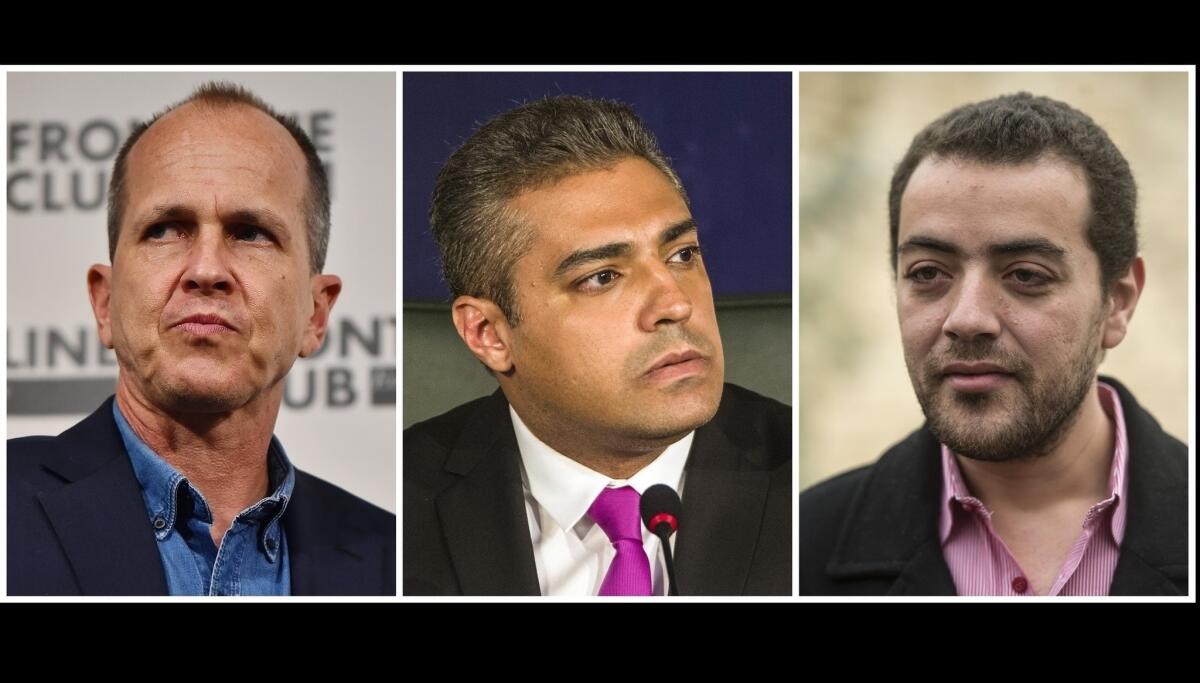Editorial: Egypt’s muffling of news media is an outrage

Al-Jazeera’s Egyptian producer Baher Mohamed (right), Egyptian-Canadian reporter Mohamed Fahmy (center) and Australian journalist Peter Greste were sentenced by an Egyptian court to three years in prison on Aug. 29.
In sentencing three Al Jazeera television journalists to three years in prison for crimes that look suspiciously like committing journalism, an Egyptian court has ruled in direct contradiction to international human rights and press freedoms. That an American ally — and the recipient of $1.3 billion in U.S. military aid — perpetrates such outrages makes the circumstances even more appalling.
Egypt, of course, isn’t the only country that seems to think muffling the media is sound policy. Washington Post reporter Jason Rezaian remains in a Tehran jail on espionage-related charges — which observers have dismissed as unfounded — as an Iran revolutionary court mulls his fate. Turkey, another U.S. ally and member of NATO, is holding two British journalists for Vice News whom it accuses of “engaging in terrorist activity” with Islamic State after the team interviewed Kurdish separatists.
Journalists take a calculated risk when they enter volatile areas of the world, but they shouldn’t have to fear being imprisoned — or executed — by a government for trying to bring truth to the world. By signing the International Covenant on Civil and Political Rights, Egypt and Turkey pledged to respect the right of journalists to work unhindered, a promise they break with regularity.
The three Al Jazeera journalists have drawn wide attention primarily because of their network’s international stature. But the Committee to Protect Journalists says Egypt, as of mid-August, was holding at least 22 local journalists in prison, six of them added since mid-June, as part of a broad crackdown tied to the continuing battle between President Abdel Fattah Sisi’s regime and the Muslim Brotherhood, from which it seized control of the government in a 2013 coup, as well as secular opposition.
The regime’s actions spotlight the United States’ conundrum in supporting democracy but needing sometimes objectionable allies such as Egypt for strategic purposes. The Obama administration froze some military aid after Egyptian troops seized control from President Mohamed Morsi, but it resumed payments this year as Egypt faced instability in neighboring Libya and threats from Islamic State-related groups.
All the same, geopolitics shouldn’t trump human rights. The U.S. government has condemned press crackdowns in Turkey and the convictions in Egypt to no avail, which tells us something about our strategic partners. The Obama administration ought to exert whatever pressure it can on Sisi to grant clemency to the Al Jazeera journalists, and on both Egypt and Turkey to free people being detained simply because the governments don’t like the truths they tell.
Follow the Opinion section on Twitter @latimesopinion and Facebook
More to Read
A cure for the common opinion
Get thought-provoking perspectives with our weekly newsletter.
You may occasionally receive promotional content from the Los Angeles Times.










